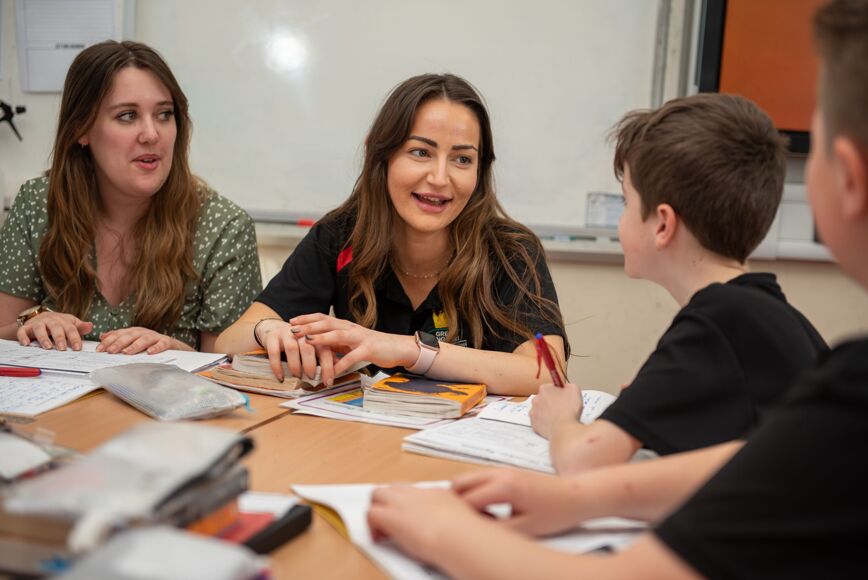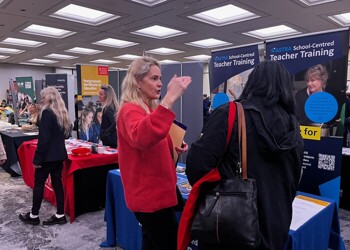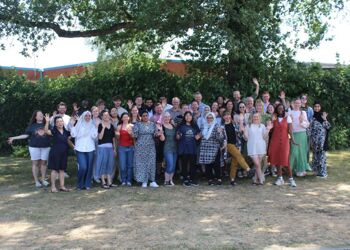 December 19th 2025
December 19th 2025- Home
- Courses
- Finding the right route
Finding the right route

Selecting the right route into teaching is an important first step for anyone considering teaching as a profession.
All our training courses lead to the qualification of Qualified Teacher Status. Most of our trainees also study towards a PGCE as well.
We know it's difficult to navigate the different routes into teaching and we'd be delighted to help you - contact us.
General information on teaching
On Get Into Teaching, you'll find all kinds of advice and information, including salaries, bursaries and general requirements for teaching. You'll also find out how to use Apply, the portal through which applications for teaching are made.
You'll find answers to lots of common questions but do get in touch with us if we can help!
Consider your options
There's lots to think about before applying.
Be sure to have read up on our primary and secondary courses so you have a flavour of what's in store.
But you also need to ask yourself some important questions:
-
What phase are you interested in?
-
Primary, secondary or special?
-
-
If you are hoping to teach in a secondary school, what will your specialist subject be?
-
Normally, it will be the subject of your degree or one close to your degree. You'll need passion and enthusiasm and a genuine interest in your speciaist subject.
-
Do you have the understanding, knowledge and skills to teach your subject up to A level? There is considerable evidence that student outcomes are related to the subject expertise of their teacher.
-
A Subject-Knowledge Enhancement course might be an option. Applying early means that you will have plenty of time in which to complete this and get your training off to a strong start.
-
-
How will you fund your studies?
-
For primary trainees, a imited number of salaried and apprenticeship places are available, normally to those who begin with significant experience of working in a school already.
-
For many secondary subjects, there are generous bursaries and grants available. Whether training to teach in primary, secondary or special education, you may well be eligible for student finance both to cover living expenses and your course fees.
-
You might be eligible for student finance via the Student Loans Company (this is how most people pay the course fees, even if on a bursary) with potentially over £10,000 available to help towards living expenses.
-
Private finance: each year a number of trainees pay their own course fees, rather than via Student Loans.
-
-
Will you train full or part time?
-
The majority of trainees are on full time course.
-
We are able to offer part time routes in primary and a number of secondary subjects. If you don't see your subject listed, ask. It is slightly more expensive to train over two years, but it can make teaching and family or other caring responsibilities manageable.
-
-
Will you study for QTS or PGCE with QTS?
-
For most trainees, we recommend the PGCE route. PGCE studies are fully integrated with your practical classroom-based training and it's the route taken by most trainees, both on full time and part time routes.
-
In some cases - for example, if you are training via a salaried route and have other responsibilities - the QTS route might be more manageable.
-
Find out more about our courses
Astra offers training both in primary and secondary phases.
Click here for more on primary.
Click here for more on secondary.
Trainees in special schools may follow either the primary or secondary route. A number of special schools for young people in the 11-18 age range follow the primary curriculum and in such circumstances it would be more appropriate to train via the primary route.
For graduates with considerable classroom experience as an unqualified teacher (a minimum of two years) we also offer an Assessment Only route to gaining Qualified Teaching Status.



